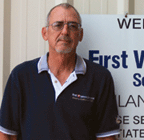Randy Book says quality systems, using data to probe processes and motivated employees are keys to effective best practices.

Quick Bio
Name: Randy Book
Company: First Vehicle Services
Title: General manager
Fleet: Richland County, S.C.
Other Positions Held: Logistics and motor officer for the U.S. Army
Industry Experience: 19 years
Best practices means several things to Randy Book of First Vehicle Services, general manager of the Richland County Service Center.
“It’s being Six Sigma certified and conducting quality measurements,” he says. “It’s having a quality system in place, collecting data, using data to analyze your process and learn what is happening, and then taking steps to improve. It needs to be driven from the bottom up, with managers providing guidance, because guys in the trenches know what’s best. You have to involve all your people to have best practices.”
On simpler terms, it’s providing the best quality service possible at the best price, he says. And, that’s Book’s mission as he and his team manage and maintain the 1,120-vehicle municipal fleet of Richland County, South Carolina. About 300 of those vehicles are medium- and heavy-duty trucks and construction equipment. His team was recognized as one of the Top 100 fleets in North America in 2005 by Fleet Equipment magazine (October 2005, page 48).
One of the ways he measures the process is through customer-satisfaction scores. Every vehicle that’s repaired gets a customer critique card that solicits feedback from drivers on a variety of items, including the quality of work, timeliness of service and an overall service rating.
“When I started here, we were getting lots of ones and twos, which is not good,” he says. “Now, we regularly get threes and fours. We are getting things done right the first time and saving our client money.”
Recruiting and retaining
One of Book’s biggest challenges is finding good, qualified technicians.
“That’s why we concentrate so much on training and retention,” he says. “Retaining technicians is not a big problem because the pay is good, the benefits are outstanding, we have a very good work atmosphere and First Group America, our parent company, is great to work for.”

One of the things technicians like is that they are guaranteed 40 hours of work every week, so they know their take-home pay will be consistent, he says. The size of the fleet and workforce – about 20 employees in the Columbia, S.C., maintenance facility – allow for steady schedules during the two eight-hour shifts.
When Book needs to hire, he starts by looking from within.
“We try to promote internally as much as possible, so I go through our human resources department in Cincinnati,” he says. “They post openings on our company Web site, so employees nationwide have the opportunity to apply for in-house openings.”
He also makes job openings known to local employment services and occasionally places ads in the local newspaper, although that has not been very effective, he says.

“Most of our recruiting happens through word of mouth,” Book says. “Employees tell their buddies about openings. If a referral is hired and passes the 90-day probationary period, the employee gets a reward. My best source of new employees has been the Fort Jackson Military Post, which houses the U.S. Army’s mechanic school and training center. We have a good relationship with them. We get young guys who are just getting out of the army or those who are retiring and taking their pension but still want to work.”
Book has a soft place in his heart for them because he spent 26 years in the military, including 10 years in fleet services. Three of his technicians are retired military; others serve in the National Guard and Naval Reserve.
Training and operations
The company places a heavy emphasis on training and backs it up with increased pay, Book says.
“We do a minimum of three hours training monthly per technician,” he says. “When it’s time for ASE testing, we break out for about two hours a week to prepare technicians for the tests. All training is on the clock.”
Technicians pay for their own ASE tests, and if they pass them, are reimbursed by the company, he says. The company prefers to hire ASE-certified technicians but sometimes will hire potential ASE-certified techs and develop them. Technicians earn an additional 10 cents per hour for each ASE certification they earn. The service center is ASE Blue Seal certified, and FVS has more Blue Seal certified service centers than any other fleet service company, Book says.
“Formal training is offered at corporate headquarters in Cincinnati for potential general managers and operations managers,” he says. “We also get training from OEMs and vendors, such as International and Napa.”
Additional technical training is offered at the nearby Midland Technical College. Technicians do that on their own time and money, but if they pass the technical training class, they receive a 75 percent tuition reimbursement, he says.
Every morning starts with a daily meeting for the entire staff, according to Book.
“We share information on a regular basis and encourage open dialog between technicians and the staff,” he says. “At least once a month, we conduct First Quality Maintenance meetings where we examine how we do what we do.”
Technicians periodically do job analyses to develop formal job standards. “If we come up with a better idea, we’ll send that up to the corporate office and have them look at what we are doing. That can result in them sending it to all our other locations.”
